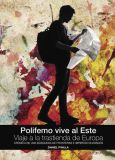New Spanish Books: The online guide of titles from Spanish publishers and literary agents with rights for translation in the UK. To consult titles available in other markets please click on the above links.
Polifemo vive al Este. Viaje a la trastienda de Europa

Travel journalism returns. In the 21st century the planet has been mapped, measured, photographed and explained down to the last detail. Is finding Terra Incognito, savouring something approaching a discovery an impossible task? Not for an exceptional reporter who follows in the wake of the great masters of literary journalism, from Robert B. Kaplan to Evelyn Waugh, not to mention Dominique Lapierre and Sir Winston Churchill. Polifemo vive al Este is an invitation to travel, to become part of a chronicle that leads the reader by the hand to the least explored corners of Europe, in search of apparently forgotten empires and frontiers whose legacies demonstrate that this is not true. If you follow his footsteps, you'll find out for yourself. Equipped only with history books and a notebook, Daniel Pinilla proposes to re-discover…
Great travel literature has always had something to do with the marvellous, be it Marco Polo or Evelyn Waugh. The author of this book shares much in common with both authors, in that the very act of travelling becomes a literary endeavour and the two live happily side by side, leading the reader on an adventure which has the added value of being a truthful account of what the traveller has encountered, without any embellishments, all the poor toilet facilities included.
(…) These scattered voices of the locals then are connected in turn to the historical analysis of the author, which is not only accurate but very satisfying in that it focusses on details not generally known, and connects them for the reader with more familiar events and developments in European history.
I think there is no doubt that the book was written with an international market in mind, as the literary references to English authors is quite extensive and the author is heavily influenced by British travel writing of the 1930s. The book would therefore translate very easily into English, because while it is written with panaché and elegance, the prose is yet very restrained (…).
(…) if anyone still doubts the reason why cultural trauma is as important as other forms of trauma should read this book, told by an intrepid explorer, who is not only brave and compassion but also superlatively well read(…).
From the reader´s report by Alex Ibarz
